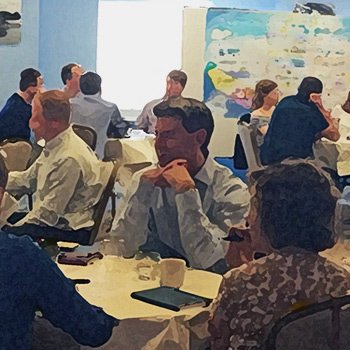A few weeks ago I wrote a blog in which I said, strategic planning is an anxiety management activity for leaders and managers who want to hold on to the illusion of control. I also said I would say more about planning in a subsequent blog, so here it is….
This week I came across some wise words on planning from Mee-Yan Cheung-Judge: ‘Long-term planning is irrelevant, if not a hindrance. Strategy should not be about the realisation of prior intent, but rather emphasis on the importance of openness to accident, coincidence and serendipity. Strategy in this case is the emergent resultant. Successful strategies, especially in the long term, do not result from fixing an organisational intention and mobilising around it, they emerge from complex and continuing interactions between people’
I think this eloquently sums up my views on strategic planning. Agile strategy is a way of being, not a thing – it’s a verb, not a noun. So the challenge for us leaders of today is, ‘you can’t buy it, you have to be it.’
Most leaders can see that our world is complex and constantly changing. However the thing that seems harder for us to embrace is that how we work needs to change, from within! Becoming agile is not something we can buy, or probably even see, and in a world that is obsessed with tangibles and measurement, that’s hard to grasp. The warm familiarity of a strategic plan is just too alluring to let go of!
I asked my colleague Fiona Stratford, ex-FD and accountant by training, what she thinks the cost of planning is in most organisations. Fiona identifies three levels of cost:
- The tangible cost of time spent planning – for someone on an annual salary of £100k, the cost per day is £500 in the UK.
- The lost opportunity cost – what would people be doing if they were not spending time planning.
- The intangible impact of planning on people – planning is often not a motivating experience, and there is the impact on people having to keep on top of their plans.
So I think it is fair to say that, the illusion of planning is costing organisations dearly. Imagine an organisation where this was invested in nourishing human connection and spirit – now that would achieve results!
That might all sound a bit ‘Mystic Meg’ to those of us who are pragmatists. To allay your concerns, I have experience of very practical ways of developing agile working but they all started by looking at my own ways of working and being willing to change my working practices. This is personally challenging work, and part of lifelong learning, rather than an injection of training – but the results are profound! I have not yet found an organisation that has developed agility despite their leaders so, when we choose this route we have do take a leaf out of Ghandi’s teaching, ‘Be the change you wish to see in the world.’


